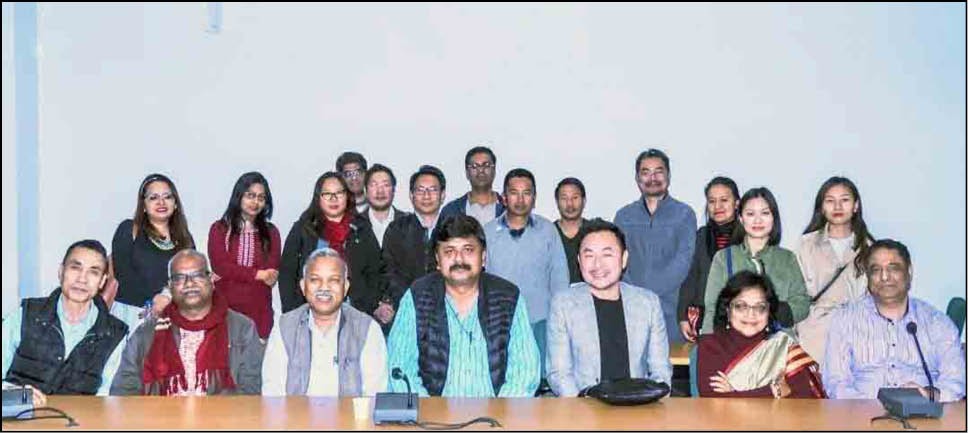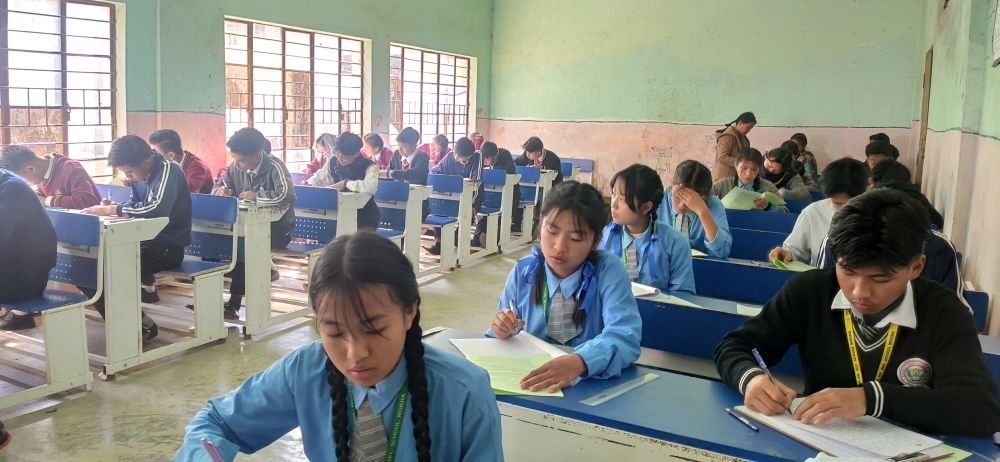NSA members with the resource persons and others during the National Debate held at School of International Studies (SIS), JNU, New Delhi on February 22. (Photo Courtesy: NSA)

New Delhi, February 25 (MExN): The Naga Scholars Association (NSA) organized a National Debate on ‘The Politics of 13 Points Roster System: Marginalization or Empowerment?’ at School of International Studies (SIS), JNU, New Delhi on February 22.
A press release issued by the NSA stated that Dr. Zuchamo Yanthan, president, NSA stated that the fear of UGC’s 13 point roster system, if it is implemented, is that the marginalized communities, especially the STs & SCs will never find job positions in universities across India, which is quite alarming.
Throwing light on the proposed roster, Yanthan stated that it is totally going against the constitution of India which protects the marginalized communities. The alternative which is being proposed is the 200 point roster system which makes the university/college as the basic unit by giving a possibility of enhancing a sustained and affirmative action for social justice.
The first speaker was Dr. Nandita Narain, former president of Delhi University Teachers’ Association (DUTA) & Federation of Central University Teachers’ Association (FEDCUTA), also the head of department of Mathematics in St. Stephen’s college, University of Delhi.
Stating that the idea/debate against reservation is racist, she traced back the scenario in 1990s when no reservation for ST was given in Delhi University. It was only after post 1996 that reservation started in India through parliament order using 40 point roster.
She stated that between 1997 to 2013, there was hardly any ST seat filled in the teaching positions in Delhi University. However, in 2017 the Allahabad High court passed a judgment against the reservation policy. Unfortunately, the government of India did not take any initiative to oppose the Allahabad High Court order. It was while the country is debating on the non-implementation of reservation, the ruling BJP party came up with the 10% reservation for the upper caste people in the name of Economic Backward class below the 8 Lacs income.
She concluded by stating that DUTA has been consistently fighting against the implementation of 13 point roster system which goes against the ethos of social justice. She said that DUTA is carrying out an all out fight to bring back the implementation of 200 points roster system.
The second speaker, Dr. Rajib Ray, president of DUTA & FEDCUTA stated that till today, DUTA is the only organized teachers’ organization which is consistently carrying out a fight for the implementation of reservation policies in universities across India. Our strength lies in the number of teachers committed for the marginalized sections, he said.
During the fight against ‘13 Points Roster System’, he mentioned that there was much difficulty in getting signatures from Member of Parliament, and even most Tribal MPs from the North East States were reluctant to sign. He stated that after much persuasion DUTA has attained the support of 17 political parties. There is also the problem of not being able to spread to other universities.
He stated that the government has to rethink about the 200 points roster system. There is also a need to urge the political parties to keep this issue in their manifesto for effective implementation.
He also cited some examples where recent advertisements in several universities have come up using the 13 point roster system. Not surprisingly, in almost all the advertisements, there were hardly any job positions for SCs, especially STs. “In this regard, if we do not unitedly fight against the 13 point roster, we will never see any STs, SCs People getting into a university teaching jobs in India.”
He concluded by stating that a huge progress has been made but we have miles to go. “We need to bring back the 200 points roster system of reservation with university as a unit.”
The third speaker Prof. D. K. Lobiyal, dean of School of computer & System Sciences, JNU stated that teachers’ movements in JNU have not been as vibrant as the last decade. He posed that the crucial issue of this debate is how to strategise to make the government of India come up with solution to the roster problem faced by the STs, SCs and the OBCs. He supported the idea of DUTA trying to put pressure on the government to come up with an ordinance under schedule 9 of the constitution of India.
The chairperson was Prof. Sukumar Narayana who teaches political science in University of Delhi. He not only summed up the discussion but also gave his perspectives on the theme. He stated that “Once this 13-point roster is accepted, if any person joins as a SC/ST or OBC in Universities, till they retire, the position will not be filled under the reserved category. So, that means, after 30 or 35 years, in the service of that candidate who joins in that centre or department, till the person retires, no one can get in. That will wipe out representation from these communities from these posts”.
He urged the scholars not to only question our representatives in parliament but also dismiss them in the coming election. The government recently announced 10% reservation in jobs and higher education for ‘economically backward’ sections. Right after that came the SC ruling about the 13 point system. “But, see the irony of it. Reservation was introduced to address the denial of social justice to the communities. Now, the people who perpetuate caste violence and reservation, they are getting reservation. The 13-point roster and the EBC reservation have both been introduced within a month,” Narayana pointed out.
“We must continue with the campaigns and talk to the people until it is achieved. We need to understand that the politics of presence is very important but politics of silence is most dangerous,” he stated in conclusion.
The debate was followed by discussions and a questions and answers session.


.jpg)
.jpg)
.jpg)
